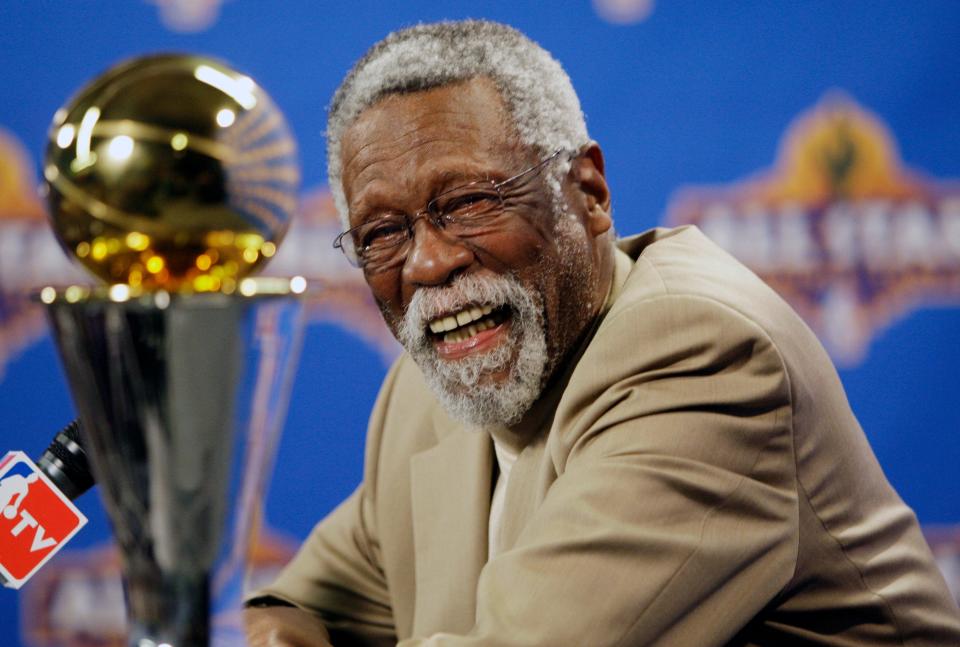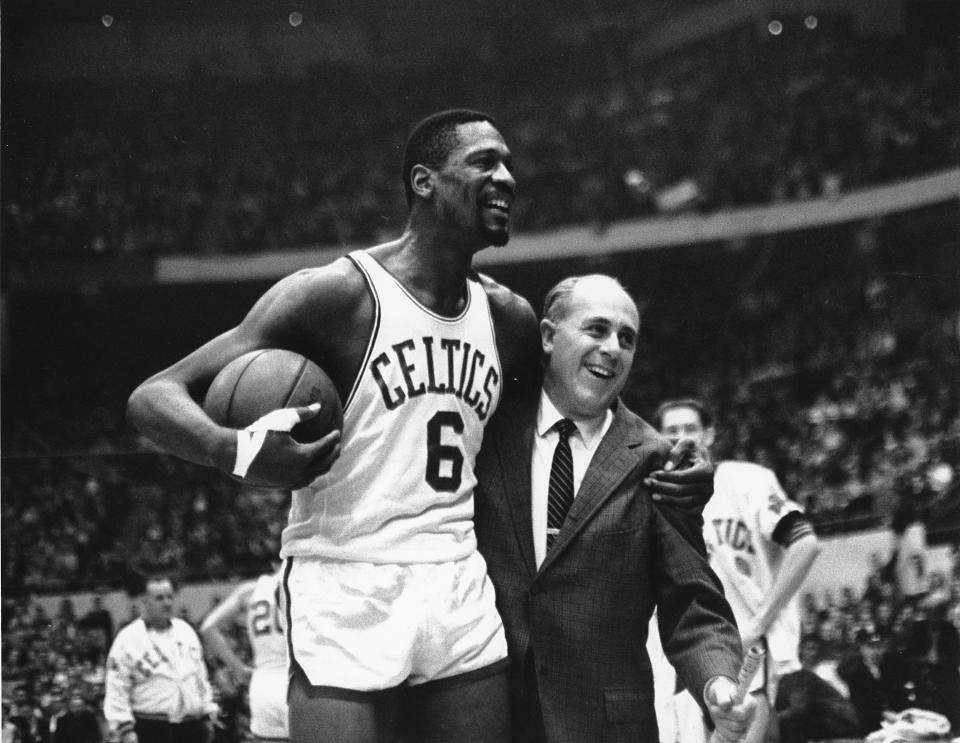Five takeaways from Bill Russell 'Legend' documentary: 'A well-rounded human being'
If you don’t know much about Bill Russell – the person and the player – then the new Netflix documentary, "Bill Russell: Legend," is for you.
If you know Russell’s story, this documentary filled with rare video footage and insight from the NBA's biggest stars, is also for you.
The two-part, 200-minute documentary directed by accomplished filmmaker Sam Pollard tells the story of the NBA’s greatest winner and steadfast champion of racial and social justice.
Weaving Russell’s story through the prism of his early life, emergence as a basketball star in college for San Francisco and in the NBA for the Boston Celtics and his steadfast pursuit of equality, Pollard shines a light on one of the most important athletes of the 20th century.
"I wanted to explore this and come away understanding that Bill Russell is not only one of the great basketball legends of all-time, if not the greatest from my perspective, but he was also a very active participant in the struggle for human rights," Pollard told USA TODAY Sports, adding, "He's a man who also understood this wasn't just about being a basketball player, it was about being a well-rounded human being. And being a Black man in America meant that he had a responsibility to stand up and speak up."
Here are five things to know about "Bill Russell: Legend":
Racial and social justice
Russell was the target of racism, from residents in suburban Boston objecting to Russell living in their neighborhood, to racists trashing Russell’s home by smearing excrement and leaving racial epithets graffitied on the wall while he and his family were away, to not being able to stay in certain hotels or eat in certain restaurants with his Black teammates.

Russell’s story, from his birth in Louisiana to the end of his life in 2022, can’t be told without addressing his activism. He was on the National Mall in Washington, D.C., when Martin Luther King Jr. gave his “I Have a Dream” speech. He was next to Muhammad Ali, Jim Brown and Kareem Abdul-Jabbar, then Lew Alcindor, at the Cleveland Summit in 1967 to support Ali’s decision not to fight in Vietnam. It is one of the most iconic images involving athletes. Russell also traveled to Jackson, Mississippi, to conduct a basketball clinic in support of Charles Evers – a decision that was considered dangerous because Evers’ brother, Medgar, was murdered in Jackson a year earlier.
And when the presence of a segregationist forced the cancellation of a graduation ceremony for Black middle-school students, Russell hosted an event for them, saying: “I asked myself where are the other voices crying out for change and there are small fires all over the United States and there’s a fire in Roxbury (neighborhood in Boston) and nobody’s listening. There’s nobody listening. But what the people don’t realize is that a fire that consumes Roxbury consumes Boston and the fire will spread.”
Bill Russell vs. Wilt Chamberlain, Jerry West
Russell’s game was defined by winning. And Celtics legendary coach and general manager Red Auerbach told Russell not to worry about stats, just worry about winning and that’s what Russell did. And to accumulate his 11 championships, he had to go through two of the best players of that era – Wilt Chamberlain and Jerry West.
Chamberlain and Russell had an on-again, off-again, on-again friendship and their battles on the court. In the playoffs, Russell owned a 29-20 advantage against Chamberlain, but Chamberlain averaged 25.7 points, 28.0 rebounds and 4.1 assists to Russell’s 14.9 points, 24.7 rebounds and 4.9 assists. (Blocks were not kept as an official statistic.)
"Now the other thing was here is Bill Russell 6-9, Will Chamberlain was 7-2," Pollard said. "He's got 30 pounds on Bill Russell, maybe 40 pounds. Bill Russell couldn't really stop this guy all the time because Will Chamberlain could score. But he knew, and he said this to his Celtics teammates as you heard in the film. He had to be able to figure out how to contain Russell enough that the Celtics players could take it down the court and win. Because as Red Auerbach says, ‘It wasn't about how many points you scored, it was about who won the game.’ And we saw who won those games."
Russell also got the best of West, with the Celtics beating West’s Lakers six times in the NBA Finals. Not beating Russell’s Celtics left West with "a hole in my heart," West said.
The viewer gets a sense of the intensity of those competitive matchups.
Bill Russell loved the Celtics

Russell didn’t care for Boston, but he loved the Celtics. Loved his teammates. White or Black. K.C. Jones, Sam Jones, Satch Sanders, Tom Heinsohn, Bob Cousy, Don Nelson, John Havlicek. He loved playing on a team with a common goal, and that while one player might be better than another, they joined together for a collective goal bigger than the individual. He loved Auerbach and what it meant to play for the Celtics. Russell and the Celtics are inseparable in this story, and one doesn’t exist in the same way without the other.
"When they brought in Russell, he was the lynchpin that cemented who the Celtics were going to become," Pollard said.
Spectacular footage
Pollard and producers had access to incredible video footage, from Russell’s days at USF, his Celtics career, sit-down interviews and even of Russell, his teammates and their significant others dancing at a house party. Russell on video dancing is worth the price of admission.
The doc includes fun footage of Cousy throwing behind-the-back and no-look, over-the-head passes. That era wasn’t just chest and bounce passes straight from Basketball 101. Magic was in the air.
"It was a pleasure to be able to look at all this wonderful archival footage, to see the evolution of the game," Pollard said.
Recommended reading
Credit to filmmakers for using noteworthy books written by Russell or about Russell, including Russell’s "Second Wind," co-authored by Taylor Branch; "Go Up for Glory,” by Russell and Bill McSweeny; "Red and Me" by Russell and Alan Steinberg; and “Tall Men, Short Shorts,” by Leigh Montville.
They also made use of comprehensive Russell biographer Aram Goudsouzian, who wrote “King of the Court: Bill Russell and the Basketball Revolution.”
Corey Stoll and Jeffrey Wright narrate “Legend,” and Wright reads the portions of books or articles written by Russell.
Follow NBA reporter Jeff Zillgitt on Twitter @JeffZillgitt
This article originally appeared on USA TODAY: Bill Russell documentary 'Legend' features all facets of Celtics great

